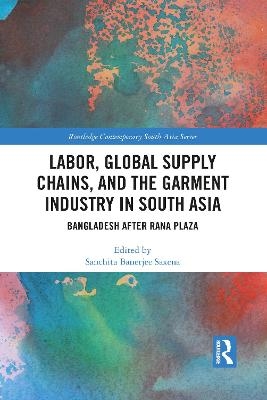
Labor, Global Supply Chains, and the Garment Industry in South Asia
Routledge (Verlag)
978-1-032-09164-8 (ISBN)
Using the 2013 Rana Plaza disaster as a departure point, and to prevent such tragedies from occurring in the future, this book presents an interdisciplinary analysis to address the disaster which resulted in a radical change in the functioning of the garment industry. The chapters present innovative ways of thinking about solutions that go beyond third-party monitoring. They open up possibilities for a renewed engagement of international brands and buyers within the garment sector, a focus on direct worker empowerment using technology, the role of community-based movements, developing a model of change through enforceable contracts combined with workers movements, and a more productive and influential role for both factory owners and the government. This book makes key interventions and rethinks the approaches that have been taken until now and proposes suggestions for the way forward. It engages with international brands, the private sector, and civil society to strategize about the future of the industry and for those who depend on it for their livelihood.
A much-needed review and evaluation of the many initiatives that have been set up in Bangladesh in the wake of Rana Plaza, this book is a valuable addition to academics in the fields of development studies, gender and women’s studies, human rights, poverty and practice, political science, economics, sociology, anthropology, and South Asian studies.
Sanchita Banerjee Saxena is the Executive Director of the Institute for South Asia Studies and the Director of the Subir and Malini Chowdhury Center for Bangladesh Studies at the University of California, Berkeley, USA.
1 Introduction: How do we understand the Rana Plaza disaster and what needs to be done to prevent future tragedies; Part I Leading to the disaster; 2 The Longue Durée and the Promise of Export-Led Development: Readymade Garment Manufacturing in Bangladesh; 3 Off the radar: Subcontracting in Bangladesh's RMG industry; Part II Dealing with the aftermath; 4 Opportunities and Limitations of the Accord: Need for a Worker Organizing Model; 5 Does third-party monitoring improve labor rights? The case of Cambodia; 6 Spaces of Exception: National Interest and the Labor of Sedition; Part III Rethinking solutions in Bangladesh; 7 Bangladesh’s Private Sector: Beyond tragedies and challenges; 8 Post-Rana Plaza responses: Changing role of the Bangladeshi government; 9 Behavior of the Buyers and Suppliers in the Post-Rana Plaza Period: A Decent Work Perspective; Part IV Rethinking solutions: from an international perspective; 10 Can Place-based network contracting foster decent work in informal segments of global garment chains? Lessons from Mewat, India; 11 Emerging solutions to the global labor transparency problem; 12 Fast Fashion, Production Targets, and Gender-Based Violence in Asian Garment Supply Chains; Part V A way forward; 13 The evolving politics of labor standards in Bangladesh: taking stock and looking forward
| Erscheinungsdatum | 01.07.2021 |
|---|---|
| Reihe/Serie | Routledge Contemporary South Asia Series |
| Verlagsort | London |
| Sprache | englisch |
| Maße | 156 x 234 mm |
| Gewicht | 421 g |
| Themenwelt | Naturwissenschaften ► Geowissenschaften ► Geografie / Kartografie |
| Sozialwissenschaften ► Politik / Verwaltung | |
| Sozialwissenschaften ► Soziologie ► Spezielle Soziologien | |
| Wirtschaft ► Volkswirtschaftslehre ► Wirtschaftspolitik | |
| ISBN-10 | 1-032-09164-9 / 1032091649 |
| ISBN-13 | 978-1-032-09164-8 / 9781032091648 |
| Zustand | Neuware |
| Haben Sie eine Frage zum Produkt? |
aus dem Bereich


